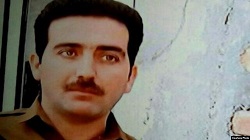
AMNESTY INTERNATIONAL
PRESS RELEASE
11 June 2020
The Iranian authorities must urgently clarify the fate and whereabouts of Hedayat Abdollahpour, a Kurdish prisoner, after local authorities told his family that he had recently been secretly executed, Amnesty International said today.
Hedayat Abdollahpour was sentenced to death in 2017 after a grossly unfair trial. On 9 May 2020, he was transferred from the central prison in Urumieh, in West Azerbaijan Province, to an undisclosed location. His family and lawyers have been desperately trying to obtain information on his fate since then.
Yesterday (10 June), the head of the Centre for the Implementation of Sentences in Urumieh told his family that Hedayat Abdollahpour had been executed three weeks ago in the city of Oshnavieh, also in West Azerbaijan province, but that he could provide no further information. However, around three weeks ago, a prosecution official had told his lawyers he was in a detention facility in Urumieh run by the Revolutionary Guards, and had not indicated that he was scheduled for execution.
“The fact that the Iranian authorities are playing these cruel games with Hedayat Abdollahpour’s family further demonstrates their contempt for human life,” said Diana Eltahawy, Amnesty International’s Middle East and North Africa Deputy Director.
“By refusing to reveal the truth, they are deliberately causing untold mental anguish and distress to his loved ones.
“If Hedayat Abdollahpour has been executed in secret, his body must be returned to his family immediately, and an independent investigation must be conducted into the circumstances surrounding his unlawful execution.”
When the family asked why they had not been informed in advance, the official claimed that he was not allowed to provide further information. He added that the execution had been carried out following “an order from above,” in apparent reference to the Revolutionary Guards overseeing the case.
Iranian law requires the authorities to inform lawyers of the scheduled execution of their clients 48 hours in advance, and grant families the right to visit their relatives for the last time. To date, Hedayat Abdollahpour’s lawyers have not been notified of his execution.
Enforced disappearance
Since Hedayat Abdollahpour was forcibly disappeared last month, Iranian authorities have repeatedly denied to share any information about his safety and wellbeing, passing his family and lawyers from one office to another.
The prison officials and prosecution authorities in Urumieh told his lawyers that they had no information about his case, and that it had been referred to Oshnavieh for processing. However, prosecution authorities in Oshnavieh denied this.
On 12 May, the deputy prosecutor in Urumieh told Hedayat Abdollahpour’s family: “When the Ministry of Intelligence and the Revolutionary Guards do not tell you where your relative is, you better refer to the cemetery.”
On 23 May, his lawyers were told by the same deputy prosecutor in Urumieh that Hedayat Abdollahpour was alive and being held in a detention facility run by the intelligence unit of the Revolutionary Guards in Urumieh, but they were given no further information on his situation.
Authorities are committing the crime of enforced disappearance, a crime under international law, so long as they refuse to disclose the fate or whereabouts of the victim or the remains.
Iranian authorities have a long-standing history of secretly executing members of ethnic minority groups and burying them in unmarked graves, and refusing to reveal their fate and the whereabouts of their remains for months or even years.
Torture and trial
Hedayat Abdollahpour was sentenced to death in 2017 in connection with an armed clash between the Revolutionary Guards and members of Kurdish Democratic Party of Iran (KDPI) which took place on 14 June 2016.
Following his arrest in August 2016, Hedayat Abdollahpour was held in solitary confinement in a detention facility run by the Revolutionary Guards for 78 days. His family has said that he lost hearing in one ear after being subjected to torture during this period.
He was accused of being a member of the KDPI, which he consistently denied. His conviction and death sentence followed a grossly unfair trial, which relied on forced “confessions” that Hedayat Abdollahpour retracted in court, and ignored serious allegations of torture and other ill-treatment.
The verdict of the Supreme Court, which has been reviewed by Amnesty International, conceded that Hedayat Abdollahpour was not in possession of any weapon and that he was not even in the area at the time of the armed clashes.
In late May 2020, Hedayat Abdollahpour’s application for a pardon was rejected for a second time by Iran’s Amnesty and Clemency Commission.
Amnesty International opposes the death penalty in all cases without exception regardless of the nature or circumstances of the crime; guilt, innocence or other characteristics of the individual; or the method used by the state to carry out the execution. Amnesty International recorded at least 251 executions in Iran in 2019 in its annual Death Penalty report.
ENDS












 Posted in
Posted in 











